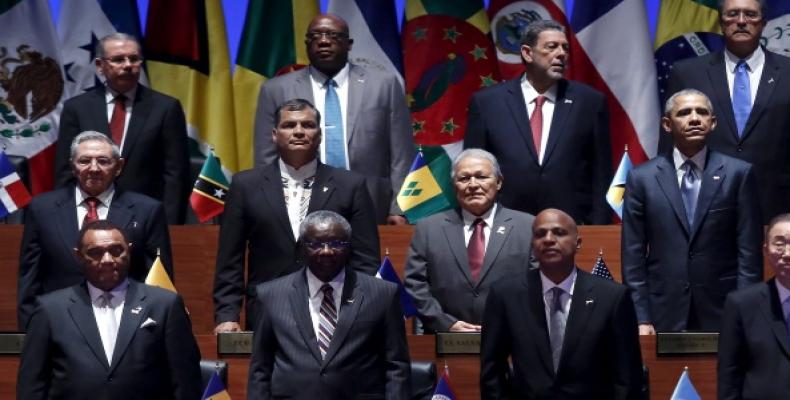Panama City, April 11 (teleSUR-RHC) Amid the historic inclusion of Cuba to the Organization of American States and U.S. bellicosity toward Venezuela, the Summit of the Americas began in Panama on Friday, at 7 p.m. local time.
Pope Francis special envoy, U.N. Secretary-General Ban Ki-moon and outgoing Secretary-General Jose Miguel Insulza all gave inaugural speeches.
Insulza said he was glad to live through such historic times, including the “negotiations for Colombian Peace,” and “the U.S. and Cuba re-establishing diplomatic relations.” He said he hopes conflicts are never resolved with violence again, calling anything other than dialogue “unacceptable.” “Dialogue is the best way to resolve differences. We are committed to peace...”
All three men spoke of challenges the region face, including immigration, energy provision, corruption and enforced disappearances. “The region is reestablishing its reputation as a zone of peace,” Ban said in his speech.
The two-day meeting includes all 35 heads of state from North, Central and South America. The world will be watching the summit as U.S. Barack Obama will also meet in person with his Cuban counterpart Raul Castro. This will be the leaders’ first ever formal meeting and is significant since the U.S.’s recent shift in foreign policy toward the tropical island nation after half a century of frozen diplomacy and the first time Cuban and U.S. presidents have met since the triumph of the island’s 1959 revolution.
In his opening speech, Ban congratulated Obama and Castro for the step forward they have taken in deciding to re-establish relations. He praised Cuba for hosting Colombia’s peace talks between government and FARC delegates.
Ban outlined the importance of women in the development of the Americas, highlighting that the Americas have the highest number of women in politics in the world. He stressed the importance of African American communities, as well as indigenous populations and young people. He said the young face some of the toughest challenges in the region, especially due to organized crime and the drug trade. The U.N. chief said also that overcoming inequality and poverty in the Americas was fundamental to change the region for the better.


